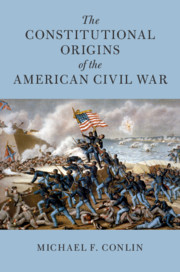(Source: CUP)
Cambridge University Press has
recently published a book on the constitutional origins of the US Civil War.
ABOUT THE BOOK
In an incisive analysis of over
two dozen clauses as well as several 'unwritten' rules and practices, The
Constitutional Origins of the American Civil War shows how the Constitution
aggravated the sectional conflict over slavery to the point of civil war. Going
beyond the fugitive slave clause, the three-fifths clause, and the
international slave trade clause, Michael F. Conlin demonstrates that many more
constitutional provisions and practices played a crucial role in the bloody
conflict that claimed the lives of over 750,000 Americans. He also reveals that
ordinary Americans in the mid-nineteenth century had a surprisingly
sophisticated knowledge of the provisions and the methods of interpretation of
the Constitution. Lastly, Conlin reminds us that many of the debates that
divide Americans today were present in the 1850s: minority rights vs. majority
rule, original intent vs. a living Constitution, state's rights vs. federal
supremacy, judicial activism vs. legislative prerogative, secession vs. union,
and counter-majoritarianism vs. democracy.
ABOUT THE AUTHOR
Michael F. Conlin, Eastern
Washington University
Michael F. Conlin is Professor of History at Eastern Washington University and author of One Nation Divided by Slavery: Remembering the American Revolution while Marching toward the Civil War (2015).
TABLE OF CONTENTS
1. The original intent of the slaveholding founders
2. Two constitutional wrongs did not guarantee a constitutional right
3. The tyranny of the Northern majority
4. The spirit of 1787
5. The constitutional right of secession
Epilogue: the Founders' constitution no more.
2. Two constitutional wrongs did not guarantee a constitutional right
3. The tyranny of the Northern majority
4. The spirit of 1787
5. The constitutional right of secession
Epilogue: the Founders' constitution no more.
More information here


No comments:
Post a Comment